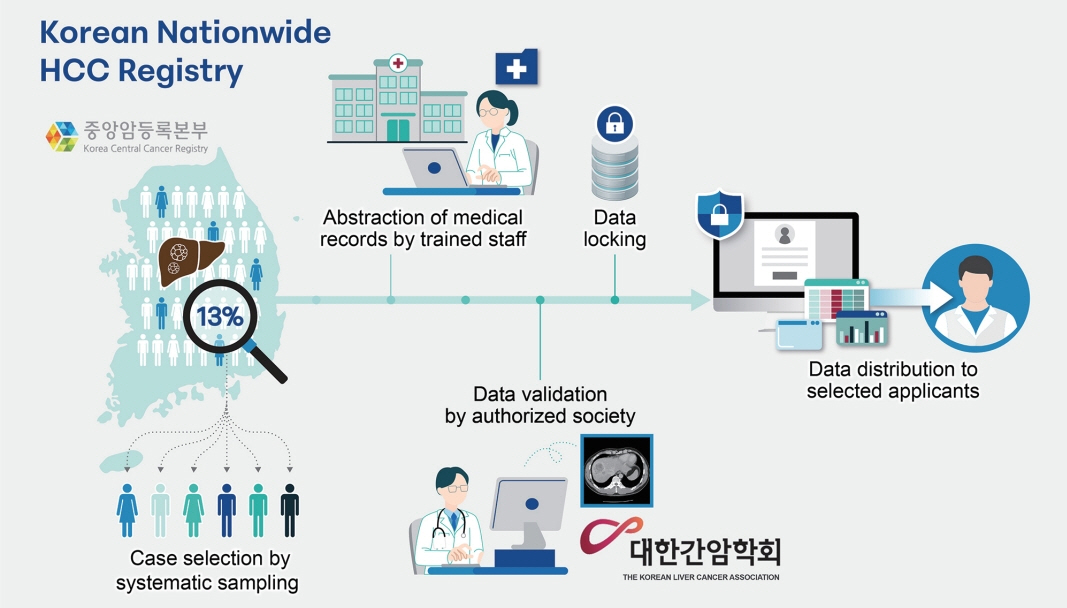J Liver Cancer.
2024 Mar;24(1):57-61. 10.17998/jlc.2024.03.03.
Advancing Korean nationwide registry for hepatocellular carcinoma: a systematic sampling approach utilizing the Korea Central Cancer Registry database
- Affiliations
-
- 1Division of Gastroenterology, Center for Liver and Pancreatobiliary Cancer, National Cancer Center, Goyang, Korea
- 2Division of Cancer Registration and Surveillance, National Cancer Control Institute, National Cancer Center, Goyang, Korea
- 3Department of Internal Medicine and Liver Research Institute, Seoul National University College of Medicine, Seoul, Korea
- 4Department of Surgery, Ewha Womans University College of Medicine, Seoul, Korea
- 5Department of Internal Medicine, Yonsei University College of Medicine, Seoul, Korea
- 6Department of Gastroenterology, Asan Medical Center, University of Ulsan College of Medicine, Seoul, Korea
- 7Korean Liver Cancer Association, Seoul, Korea
- KMID: 2553818
- DOI: http://doi.org/10.17998/jlc.2024.03.03
Abstract
- Hepatocellular carcinoma (HCC) presents a substantial public health challenge in South Korea as evidenced by 10,565 new cases annually (incidence rate of 30 per 100,000 individuals), in 2020. Cancer registries play a crucial role in gathering data on incidence, disease attributes, etiology, treatment modalities, outcomes, and informing health policies. The effectiveness of a registry depends on the completeness and accuracy of data. Established in 1999 by the Ministry of Health and Welfare, the Korea Central Cancer Registry (KCCR) is a comprehensive, legally mandated, nationwide registry that captures nearly all incidence and survival data for major cancers, including HCC, in Korea. However, detailed information on cancer staging, specific characteristics, and treatments is lacking. To address this gap, the KCCR, in partnership with the Korean Liver Cancer Association (KLCA), has implemented a systematic approach to collect detailed data on HCC since 2010. This involved random sampling of 10-15% of all new HCC cases diagnosed since 2003. The registry process encompassed four stages: random case selection, meticulous data extraction by trained personnel, expert validation, anonymization of personal data, and data dissemination for research purposes. This random sampling strategy mitigates the biases associated with voluntary reporting and aligns with stringent privacy regulations. This innovative approach positions the KCCR and KLCA as foundations for advancing cancer control and shaping health policies in South Korea.
Figure
Cited by 1 articles
-
Heavy smoking increases early mortality risk in patients with hepatocellular carcinoma after curative treatment
Jaejun Lee, Jong Young Choi, Soon Kyu Lee
J Liver Cancer. 2024;24(2):253-262. doi: 10.17998/jlc.2024.06.02.
Reference
-
References
1. Kang MJ, Jung KW, Bang SH, Choi SH, Park EH, Yun EH, et al. Cancer statistics in Korea: incidence, mortality, survival, and prevalence in 2020. Cancer Res Treat. 2023; 55:385–399.
Article2. Edwards D, Bell J. Cancer registries--future development and uses in Britain. J Public Health Med. 2000; 22:216–219.3. Brewster DH, Coebergh JW, Storm HH. Population-based cancer registries: the invisible key to cancer control. Lancet Oncol. 2005; 6:193–195.
Article4. Kang MJ, Won YJ, Lee JJ, Jung KW, Kim HJ, Kong HJ, et al. Cancer statistics in Korea: incidence, mortality, survival, and prevalence in 2019. Cancer Res Treat. 2022; 54:330–344.
Article5. Hong S, Won YJ, Lee JJ, Jung KW, Kong HJ, Im JS, et al. Cancer statistics in Korea: incidence, mortality, survival, and prevalence in 2018. Cancer Res Treat. 2021; 53:301–315.
Article6. White MC, Babcock F, Hayes NS, Mariotto AB, Wong FL, Kohler BA, et al. The history and use of cancer registry data by public health cancer control programs in the United States. Cancer. 2017; 123 Suppl 24:4969–4976.
Article7. Wang HJ. Cancer registry for primary liver cancer. Korean J Hepatobiliary Pancreat Surg. 2004; 8:207–216.8. Ichikawa T, Sano K, Morisaka H. Diagnosis of pathologically early HCC with EOB-MRI: experiences and current consensus. Liver Cancer. 2014; 3:97–107.
Article9. Kim BH, Lim YS, Kim EY, Kong HJ, Won YJ, Han S, et al. Temporal improvement in survival of patients with hepatocellular carcinoma in a hepatitis B virus-endemic population. J Gastroenterol Hepatol. 2018; 33:475–483.
Article10. Yoon JS, Lee HA, Park JY, Kim BH, Lee IJ, Chon YE, et al. Hepatocellular carcinoma in Korea between 2008 and 2011: an analysis of Korean Nationwide Cancer Registry. J Liver Cancer. 2020; 20:41–52.
Article11. Chon YE, Lee HA, Yoon JS, Park JY, Kim BH, Lee IJ, et al. Hepatocellular carcinoma in Korea between 2012 and 2014: an analysis of data from the Korean Nationwide Cancer Registry. J Liver Cancer. 2020; 20:135–147.
Article12. Yoon JS, Lee HA, Kim HY, Sinn DH, Lee DH, Hong SK, et al. Hepatocellular carcinoma in Korea: an analysis of the 2015 Korean Nationwide Cancer Registry. J Liver Cancer. 2021; 21:58–68.
Article13. Andersson TM, Rutherford MJ, Myklebust TÅ, Møller B, Soerjomataram I, Arnold M, et al. Exploring the impact of cancer registry completeness on international cancer survival differences: a simulation study. Br J Cancer. 2021; 124:1026–1032.
Article14. Merriman KW, Broome RG, De Las Pozas G, Landvogt LD, Qi Y, Keating J. Evolution of the cancer registrar in the era of informatics. JCO Clin Cancer Inform. 2021; 5:272–278.
Article
- Full Text Links
- Actions
-
Cited
- CITED
-
- Close
- Share
- Similar articles
-
- Cancer Registry for Primary Liver Cancer
- (The Utility of Cancer Registry Software in Korea): The Software of 'CANCER' by Korea Central Cancer Registry Program
- Yoon et al. Hepatocellular Carcinoma in Korea: an Analysis of the 2015 Korean Nationwide Cancer Registry
- Annual Report of the Korea Central Cancer Registry Program 2000: Based on Registered Data from 131 Hospitals
- The Development of the Korean Lung Cancer Registry (KALC-R)


